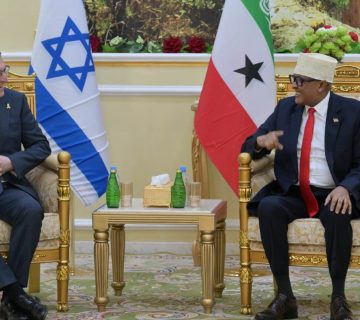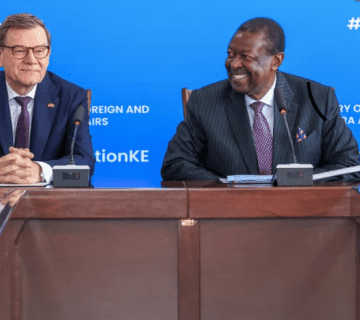Recent developments in Ethiopia have brought the difficulties of negotiating nationhood in patched up nation-states into sharper focus. It has become apparent – from the arrest of scores of supporters of an opposition party following a failed coup d’etat in Ethiopia, both events occurring in June 2019 – that the suppression of the aspirations of different nations in a complex ‘mosaic’ state in the pursuit of statehood can undermine both the nations and the host state. This, ultimately, undermines the viability of the affected nation-state.
On June 22, 2019, five senior political and military officials, including Army Chief of Staff, General Seare Mekonnen, were killed in related attacks in Bahir Dar, the capital of Amhara, Ethiopia’s largest regional state, and in Addis Ababa, Ethiopia’s capital. Critics have attributed the failed coup to unrest occasioned by Prime Minister Abiy Ahmed’s rapid economic growth policy, arguing that his development agenda is leaving segments of the population behind. The extent to which the attempted coup may or may not be linked to Abiy’s development agenda is not yet clear. What is clear is that Ethiopia’s infrastructure is developing, and the country’s economy is growing. Ethiopia, according to the World Bank, is now Africa’s fastest growing economy, with this growth averaging at about 10.2 per cent annually.
Before the dust could settle on the attacks and the criticisms, scores of members and supporters of the newly-founded National Movement of the Amhara, an opposition party, were arrested in Oromia State, on June 27, 2019, in connection with the coup attempt of June 22, 2019. The Movement, which was founded in 2018, distanced itself from the event, and condemned the attacks on the slain officials. However, the schism between this Movement and another political party affiliated to the Amhara nation within the ruling coalition in Ethiopia, the Amhara Democratic Party (ADP), has cast the ruling party’s suspicion light on the Movement. The ruling coalition, Ethiopian People’s Revolutionary Democratic Front (EPRDF), is made up of four political parties: Tigray People’s Liberation Front (TPLF), ADP, Oromo Democratic Party (ODP), and Southern Ethiopian People’s Democratic Movement (SEPDM). EPRDF’s current leader is Ethiopia’s Prime Minister, Abiy Ahmed. From these arrests, it may appear that Abiy’s government is sacrificing democracy and peace at the table of development.
Given the largely unmanaged ethnic diversity of brand Ethiopia, it should not surprise anyone that suspicions, accusations, and counter-accusations characterize the socio-political fabric of the largest state in the greater Horn of Africa region. There are more than 80 ethnic groups in Ethiopia’s 108-million-strong population. In other words, there are at least 80 nations in the Ethiopian state, which is also the world’s most religious country, according to Pew Research (2018). The largest ones, Oromo and Amhara, have a combined population that is more than 50 per cent of all Ethiopians. Abiy belongs to the Oromo nation. Others like Tigray and Somali are comparatively smaller, but are also fairly influential. These differences, coupled with mistrust, create tensions between groups (nations).
Since August 1995, EPRDF has advanced nation-based (ethnic) federalism, a policy that Abiy’s predecessor, Meles Zenawi, promoted. Ethiopia’s experiment with this form of regional federalism has not yet produced the desired rights-oriented results of acknowledging and promoting the rights of different groups (nations), and of rights to self-administration of Ethiopians. This is partly because of the complexity that the diversity of ethno-cultural groups there presents. The challenges of constituting administrative units based on nationhood in a nation-state with unequally sized constituent nations is not unique to Ethiopia though. With the exception of Somalia, which is a ‘perfect,’ homogenous nation in a state – because the Somali nation inhabits Somalia – all other states in the greater Horn of Africa region are imperfect ‘mosaic’ states (states that are a rough patchwork of nations).
Djibouti, for example, hosts three nations: Somali, Afar, and French Arab Ethiopians. Kenya is a patchwork of more than 40 nations. Kenya, like Ethiopia, is experimenting with federalism. Following the promulgation of the 2010 Constitution, Kenya adopted a devolved form of government, and now has 47 counties. Unlike Ethiopia, Kenya’s devolved units are not strictly ethnic-based. Still, both Kenya and Ethiopia, for instance, continue to grapple, periodically, with tensions between different nations. This can be explained by the observation that initiatives to acknowledge and celebrate different nations often with those intended to build the state. The ‘Mimi ni Mkenya’ (I am Kenyan) campaign in Kenya, which aims at promoting patriotism seems to be in opposition with aspirations of nations like the Agikuyu, Luo, or Maasai, for example. This becomes evident in times of crises, such as after a disputed presidential poll, or when there are feuds between the ruling party and the opposition.
That Matter of Sequence
Important indices, such as the Human Development Index, the Peace Index, or the Corruption often reflect the interaction between democracy, peace, and development. Attaining the perfect balance between and among these indices is no mean feat in a country as complex as Ethiopia. It seems that EPRDF believes that a developed Ethiopia will become a peaceful, more democratic Ethiopia. The important question to ask here is should Ethiopia be pursuing development to achieve democracy and peace, or would it rather be pursuing democracy and peace to realize its development? Abiy has prioritized development, and is hastening its pace. This fast-paced approach to development is disgruntling groups that the process is inadvertently marginalizing, including the youth (the Qeeerroo). The youth are increasingly mobilizing themselves against the government, in the Oromiya State and areas around Addis, for example. As Mesenbet, and Ethiopian scholar, notes, some of the violent political outcomes that Ethiopia is witnessing are a result of the recent rise of Qeeerroo. It may be that Ethiopia’s approach is defective, and that the alternatives may be better suited to the realities of the country. Ethiopia could be better off pursuing peace and democracy to achieve development. Alternatively, Ethiopia may need to develop its own brand of democracy, and pursue it alongside its development agenda, without trampling on the rights of the nations it (Ethiopia) hosts.
One way to overcome perennial ethnic-based tensions, including those that are stroked by attempts at overthrowing a leader, is to acknowledge that individuals belong to both their nations and their state at the same time. As such, individuals should not be compelled to make a choice between ceding their loyalties to either their nations or their state. Neither should they have to prioritize their state over their nation (patriotism), nor their nation over their state (nationhood). Another way would be to allow for nations within the states to negotiate among themselves. This may lead to two outcomes: negotiated co-existence, or negotiated balkanization. South Africa, post-apartheid, is an example of negotiated co-existence that resulted in the Rainbow Nation. All 11 constituent nations in the Rainbow Nation are acknowledged and participate in the affairs of the state, and the 11 languages of these nations are the official languages in South Africa. The balkanization of the former Soviet Union (USSR) has resulted in the formation of several nations, including Georgia (Sakartvelo), Czech Republic, and Slovakia. Each of the resulting nation-states now drive their own development agendas.
Whichever way, the needs of nations within states should be negotiated and met without undermining either nationhood or statehood. Abiy will be able to tide over this test of his leadership and cure the migraine of managing his complex ‘mosaic’ state by pursuing both peace and development while allowing for concurrent expressions of nationhood and statehood. This would mean re-evaluating the ethnic federalism model, ensuring that the rights of all groups are respected (good power relations), and that development projects do not disenfranchise some Ethiopians (equitable power (re)distribution). To these ends, Abiy should consider liberalizing the economy. Doing so will remove the ruling party’s role in setting market prices in the country, and open up the markets. This in turn would create more jobs, and reduce economic disenfranchisement and exclusion, and with it the chances of socio-political unrest.
Roselyne Omondi is the Associate Director, Research, at the HORN Institute
Photo Credit: Reuters



